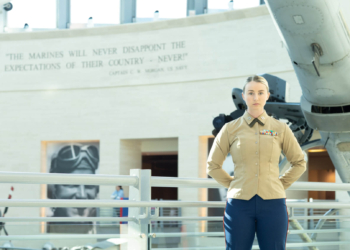When Master Sgt. Philip Berry returned home from his first active-duty Air Force deployment he had an important person to meet – his newborn daughter, Priscilla, who came into the world while he was away serving the country.
Up until his homecoming, he’d only seen his 3-month-old girl through Skype calls. Missing her birth was a sacrifice for both mother and father. His wife, Charna Berry, remembers holding their daughter at the airport, anxious for the two to finally meet.
“Just the anticipation of how (the baby) would respond to him, seeing him in person for the first time,” she recalled. “When he got off the plane and saw us and came to us, it was emotional. The one thing I remember thinking is, ‘Thank you, Lord, I’m glad he’s home safe.’ It was tough having him gone.”
That reunion was more than a decade ago. Now, after nearly 13 years of active-duty service, Philip is entering another new chapter. He’s transitioning from full-time airman to serving in the Air Force Reserve. It’s a choice he made to honor the sacrifices his wife and two children have made and to allow them to build a future in a permanent home.

“I didn’t want to put my kids through moving constantly,” Philip said. “My kids are finally making friends, and grandpa and grandma are an hour away and can see them every weekend.”
But most of all, he wanted to give his wife the same gift she gave him — the ability and support to pursue her dreams.
“My wife, she’s the reason I was so successful as I was active duty and why I probably have the job I have now because she decided to put so much into me,” he said. “And now that I’m not being dictated by the military, I can put some of that back into her.”
Finding a new purpose
Philip decided to join the reserves when he faced a looming PCS attached with a recent promotion. He made up his mind more than a year before the transition officially happened.
“If I didn’t have the amount of time I had, it would have been kind of more stressful,” he said. “I would say the timeframe and the amount of information that you get on the way out can be overwhelming for sure.”
The official recommendation from the Department of Defense is that service members start taking Transition Assistance Program (TAP) classes no less than two years before making the change.
It’s common for service members to feel rushed in the process. According to survey data compiled by the veteran community on Military-transition.org, more than half of people leaving active duty felt the transition took more time than expected, and 48% reported it was more difficult than anticipated.
Looking back, Philip wishes he would have known some things much earlier, especially the importance of a well-maintained medical record.
“I feel like it’s kind of a secret until you get into those seminars or talk to someone who actually got out and was able to maximize their disability percentages,” he said. “I feel like a lot of veterans don’t find that out until the end, and then they’re fighting Veterans Affairs because they’re having to go to more appointments.”
Having served in the Air Force for more than four years, but less than 20, Philip is part of the military population considered 24% more likely by Military-transition.org to have a difficult time finding a job immediately at an expected income level.
He learned from TAP classes to prioritize LinkedIn as a networking tool. He ended up landing a job with a veteran-friendly employer, Amazon, as a human resources business partner three months before leaving active-duty status. It’s a job he feels he would never have gotten if he hadn’t utilized education benefits to finish a college degree.
“Get the education you can prior to getting out,” he suggested. “I don’t know how many jobs that all it is, is a box that you have to check that you have your four-year degree. Does that mean you’re not qualified if you don’t have it? No, but it is definitely something that will keep you out of the conversation.”
He admits working in the private sector comes with some challenges, but he’s found the culture at Amazon to be supportive and appreciates that several other veterans surround him.
Still on a mission to serve
Not ready to give up military life completely, Philip transitioned to the reserves. He was happy to continue working toward retirement benefits and appreciated the ability to keep his family on the low-cost TRICARE Select health care plan.
The new flexibility, especially when living close to family, is something he enjoys. Instead of working for the military full time, he spends one weekend per month with his unit at Patrick Space Force Base, Florida, and will complete two weeks of annual training each year.
“The unit is definitely more of a family feel because a lot of people have been there for a long time,” he said. “In the reserves, it’s a little more predictable, and you get to know who your boss is, and those people have kind of roots in whatever area they’re in.”
“This is more of a balance that fits our life currently,” Charna said.
A place to put down roots
The Berrys faced a challenging housing market and moved quickly to find their new home.
“I’m a planner,” Charna said. “I have to be a few steps ahead when it comes to living situations.”
More than six months before the big move, the couple looked for a home, eventually selecting the small community of Davenport, Florida, to dodge nearby Tampa’s pricey housing market.
“The housing market made the process a little bit more challenging,” added Philip. “Fortunately for us, we had a good amount of time to find housing in advance of separation, and we encourage anyone making the transition to do their research and make moves in advance.”
More time for family and self
After sacrificing many important moments together in the past dozen years, family time looks different for the Berrys now.
“With the transition from Phil being on active duty to reserves, it has allowed him to be more active and supportive in our daily lives,” Charna said. “He is able to attend our kids’ soccer practices, which has been really nice. He wasn’t always able to make those types of things in the past.”

As there’s no longer the possibility of a PCS, she can also focus on her own career goals. Charna is now studying elementary education at St. Petersburg College while working as an instructional assistant in a local school district’s Exceptional Student Education resource department.
Philip enjoys the new freedom and control to carve out his path. He encourages others making the transition to reach out to other veterans for help and said there’s a large community eager to support people making their next step.
“In the Air Force, you’re going to do what lines up with what the Air Force needs, not necessarily what Phil or Sgt. Berry desires or wants,” he said. “I can still go do my military service, but I feel like it’s more on my terms.”







































